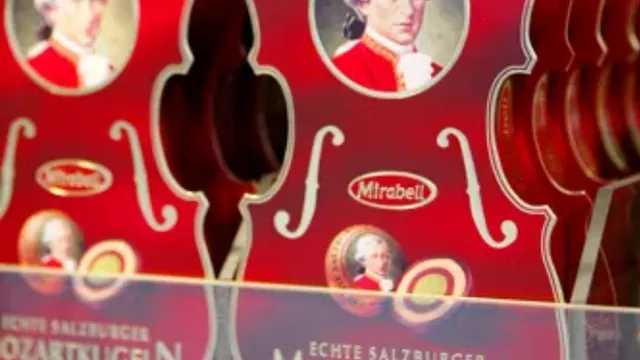In a small luxury confectionery in Vienna, chefs are putting the finishing touches to one of Austria's most famous souvenirs: Mozart balls, chocolate balls filled with marzipan, pistachios, and a rich nougat with almonds and hazelnuts.
The family-run Leschanz company still makes Mozartkugeln chocolate balls by hand before packaging them in their distinctive wrappers featuring a portrait of the 18th-century Austrian composer Wolfgang Amadeus Mozart.
But Leschanz is in the minority these days, and with the growing number of brands, the chocolate bonbons loved by tourists and locals alike are often no longer even produced in Austria.
American food giant Mondelez, which owns one of the most recognizable brands, moved production from the Austrian city of Salzburg—Mozart's birthplace—to Eastern Europe last month, reigniting a heated and long-running marketing debate.
"It's a shame because Mozartkugeln are an Austrian product," chief confectioner and owner Wolfgang Leschantz, 75, told AFP.
His company requires 10 traditional steps to produce a single Mozartkugel, and around 20,000 of these delicacies are produced to order every year.
Invented by confectioner Paul Fürst in Salzburg in 1890, Mozartkugeln became popular in Europe after winning a gold medal at a food fair in Paris in 1905.
Fürst's great-great-grandson, Martin, now owns the business, which produces around 3.5 million handmade balls a year, still in Salzburg and still using the traditional recipe.
Fürst chocolate balls can now be ordered online with delivery throughout Europe.
But with growing popularity came imitators and a host of counterfeits, different fillings, packaging, names, as well as competing claims and legal disputes.
The Fürst family had to fight for years to get the "Original Salzburger Mozartkugel" (the original Salzburg chocolate balls) wrapped in silver foil with a blue stamp recognized, including in court, because their ancestor made the mistake of not protecting his creation from the start.
Mozart chocolate balls do not have protected designation of origin status, which is European protection for food products from specific geographical areas, such as champagne and parmesan.
Even the German giant Reber, which produces 500,000 balls a day just across the border from Salzburg, is entitled to call its balls "authentic," although it cannot use the term "original."
For decades, the group's chocolate bonbons were produced in a factory in Salzburg, but it closed last year after years of being on the brink of bankruptcy.
Citing high cocoa prices and rising energy costs, Mondelez said the Mirabell brand was a "real gem," but the weight of the products had to be slightly reduced "to remain competitive."
Mondelez's Mozart chocolate bonbons sell for around $0.50 each, while one of Leschanz's handmade bonbons costs more than seven times as much.
The Pro-Ge union, which represents over 60 workers laid off when the Salzburg factory closed, has criticized Mondelez's "lack of transparency" regarding the new production facility.
"The supply chain for an egg can be traced better," the union said. | BGNES
Mozart chocolate scandal leaves a bitter taste in Austria

BGNES
With its growing popularity came imitators and a series of counterfeits, different fillings, packaging, names, as well as competing claims and legal disputes.


 Breaking news
Breaking news
 Europe
Europe
 Bulgaria
Bulgaria





